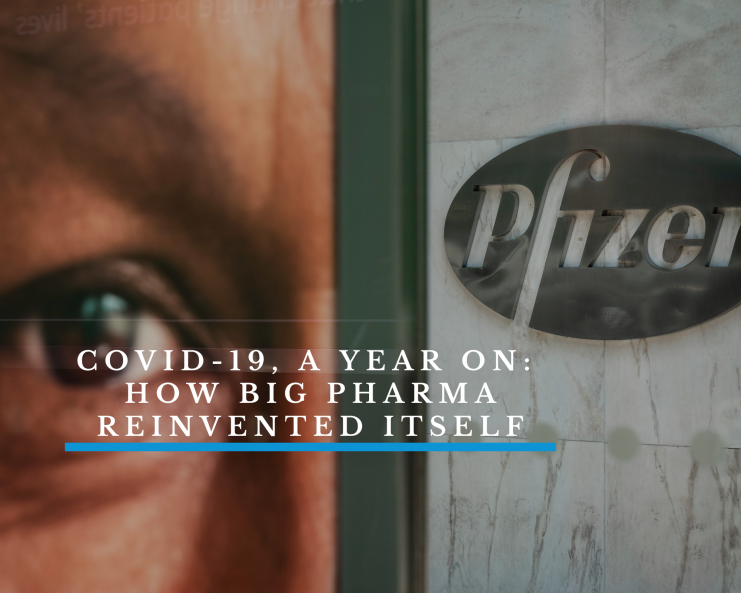Covid-19, a year on: How Big Pharma reinvented itself

In this series, City A.M. looks back at the last year of the pandemic and Covid restrictions and takes stock of its impact on industries and issues at the heart of British society.
Read more: Read the full Covid-19, a year on series here.
Six years ago, pharmaceutical chief executive Martin Shkreli drew international condemnation when his company, Turing Pharmaceuticals, bought the patent for a lifesaving antiparasitic drug and raised the price by more than 5,000 per cent.
Shkreli, who likened himself to the “robber barons” of 19th century industrialism, came to epitomise the moral bankruptcy associated with Big Pharma.
Despite huge strides in public healthcare, the pharmaceutical industry has seen its reputation tarnished in recent decades in the face of price gouging scandals, the opioid epidemic in America and virulent conspiracies about “corporate evil”.
By 2018, Big Pharma was the least-trusted industry in the US and the worst-rated healthcare sector in the world, according to analytics firm Gallup. What had once been hailed as the epicentre of innovation had become a dirty word.
But, as anyone who has endured the hokey cokey of various lockdowns over the past 12 months can attest to — a lot can change in a year.
As coronavirus cases and hospitalisations shot up across the globe last spring, pharmaceutical firms scrambled to find new treatments to prevent severe infection from Covid. Remdesevir, a drug normally used to treat Hepatitis C, was repurposed by US biotech firm Gilead to treat coronavirus. So too was Dexamethasone, a common anti-inflammatory steroid. NHS figures released earlier this week showed the drug is thought to have saved the lives of more than one million coronavirus sufferers around the world, including that of former US President Donald Trump.
Crucially, less than nine months after the World Health Organization (WHO) declared a pandemic last March, Big Pharma created a coronavirus vaccine. In normal times, vaccines usually take around 10 years from inception to injection.
Hailing the moment 90-year-old Margaret Keenan became the first person to receive a Covid vaccine outside of a clinical trial as “V-Day,” health secretary Matt Hancock said it was “a tribute to scientific endeavour”. Pfizer’s coronavirus jab was soon followed by Astrazeneca’s, then Moderna’s, while other pharma giants are still clambering to secure their positions as heroes of the pandemic.
The race against a rampaging new virus presented Big Pharma with a “once in a generation opportunity to reset” its reputation, according to David Ricks, chief executive of US pharmaceutical firm Eli Lilly. Over the past year, Shkreli’s image as the poster boy of a greedy industry has been replaced by saintly depictions of pharma bosses such as Dr. Ugur Sahin and Dr. Özlem Türeci, the husband-and-wife team behind German vaccine firm Biontech.
The Covax alliance, which aims to send hundreds of millions of vaccine doses to 92 lower-income countries at no cost by the end of the year, has been welcomed as a noble, albeit snail-paced, venture. One Astrazeneca executive told City A.M. he was “actually proud” of what he was doing “for the first time in ages”. “There’s an overwhelming sense that we’re doing something good. I drop my daughter off at school and the other parents give me a pat on the back,” he said.
Polling by firms such as Harris and Gallup showed public trust in pharmaceuticals companies rocketed last year, before the various Covid vaccines even hit the shelves. The coronavirus crisis has so far proved favourable for Big Pharma.
But whether or not the pharmaceutical industry can cement its newfound reputation will rely on the speed and success of vaccine rollouts in countries around the world.
In the UK, where more than half of the adult population have received their first dose of a Covid jab, the bright halos around Big Pharma bosses like Astrazeneca chief Pascal Soriot are likely to stick for some while to come. But the same can hardly be said for the EU, where pharma chiefs, and Soriot in particular, have been made scapegoats for a sluggish immunisation programme.
And then there’s the money. Pfizer said last month that it expects to sell $15bn (£10.9bn) of its Covid vaccine this year, with profit margins in the “high 20s”. On the other hand, companies such as Astrazeneca and Johnson & Johnson have vowed not to make a profit on their Covid vaccines during the pandemic.
But what happens when the pandemic is over? Both companies are clearly pointing to a medical end to the pandemic in their price promises, rather than a social one. As Professor Chris Whitty, England’s chief medical officer, said earlier this week, the chances of eradicating Covid across the globe are “close to zero”. But that doesn’t mean Astrazeneca and J&J will never be able to hike up the bill. The temporary no-cost initiative should be commended, but the drugmakers will be free to line their pockets once more as death rates plummet — even if the world will need annual booster shots.
The pandemic has seen something of a Renaissance for pharmaceutical companies, whose share prices have long suffered at the hands of their industry’s reputation. Astrazeneca, Pfizer and Biontech have all become household names, and their stocks are the better for it.
If Big Pharma continues to place people over profits, its image makeover might just be here to stay beyond the global vaccine rollout. But that will require the completion of national immunisation programmes before new Covid variants emerge. While the pandemic may have ushered a new era for Big Pharma in Britain, then, its reputation across the EU and further afield is less certain.